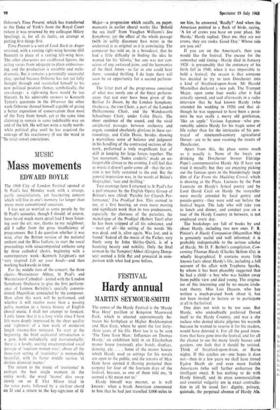Mass movements MUSIC
EDWARD BOYLE
The 1968 City of London Festival opened at St Paul's last Monday week with a strange, partly unsatisfctory, yet fascinating concert which will live in one's memory far longer than many more conventional successes.
I was not so worried as some people by the St Paul's acoustics, though I should, of course, have heard much more detail had I been listen- ing over the air; nor, thanks to my neighbour, did I suffer from the gross insufficiency of programmes. But I do question whether it was wise, after the Britten version of the national anthem and the Bliss fanfare, to start the vocal proceedings with unaccompanied anthems sung by three cathedral choirs, beginning with a contemporary work—Kenneth Leighton's not
` very inspired Lift up your heads—and then working backwards in time.
For the middle item of the concert, the three choirs—Westminster Abbey, St Paul's and Westminster Cathedral—joined with the London Symphony Orchestra to give the first perform- ance of Lennox Berkeley's specially commis- sioned Magnificat, conducted by the composer. How often this work will be performed, and whether it will receive more than a passing polite mention in a future history of English choral music, I shall not attempt to forecast. I only know that it is a long while since I have felt more deeply impressed by the sheer quality and 'rightness' of a new work of moderate length (twenty-five minutes). To start at the beginning, the brief orchestral introduction is a gem, both melodically and instrumentally; there is a lovely, soaring unaccompanied vocal passage at 'sanctum nomen eius'; above all the three-part setting of 'esurientes' is memorably beautiful, with its faster middle section 'et divities dismissit Manes.'
The return to the music of 'esurientes' is perhaps the best single moment in the entire work; the word 'manes' dies away slowly on an E Flat Minor triad in the voice parts, followed by a six-four chord on D and a return to the key-signs lure of G Major—a progression which recalls, on paper, moments in earlier choral works like 'Behold the sea itself' from Vaughan Williams's Sea Symphony, yet the effect of the whole passage (with its softly dissonant bass notes in the orchestra) is as original as it is convincing. The composer has told us, in a broadcast, that he had a little difficulty in finding the idea he wanted for his 'Gloria,' but one was not con- scious of any awkward joins, and the harmonies of the final Amen—so far as one could hear them—sounded thrilling. I do hope there will soon be an opportunity for a second perform- ance.
The latter part of the programme consisted of what was surely one of the finest perform- ances that can ever have been given of the Berlioz Te Deum, by the London Symphony Orchestra, the tso Choir, a part of the London Philharmonic Choir, and the Wandsworth Schoolboys Choir, under Colin Davis. The sheer opulence of the sound, and the vivid antiphonal passages between orchestra and organ, sounded absolutely glorious in these sur- roundings, and Colin Davis, besides showing a marvellous sense of balance and judgment in his handling of the contrasted sections of the work, performed a truly magnificent feat of skill in keeping his large forces together. The last movement, 'Index crederis,' made an un- forgettable climax to the evening. I still feel that as music it doesn't quite come off—that the ten- sion is not fully sustained to the end. But the general impression was, in the words of Belioz's biographer, 'vast and thrilling.'
Two evenings later I returned to St Paul's for a perf3rmance by the English Opera Group of Britten's new (third) 'Parable for Church Per- formance,' The Prodigal Son. This seemed to me, at a first hearing, an even more moving and significant work than its two predecessors, especially the choruses of the parasites, the monologue of the Prodigal (Robert Tear) after he has been stripped of all his substance, and —most of all—the setting of the words 'He was dead, and is, alive again, Was lost, and is found.' Indeed all the music of the Father, very finely sung by John Shirley-Quirk, is of a haunting beauty and nobility. Only the final sermon by the Tempter/Abbot (Gregory Demp- sey) seemed a little flat and prosaical in com- parison with what had gone before.






































 Previous page
Previous page